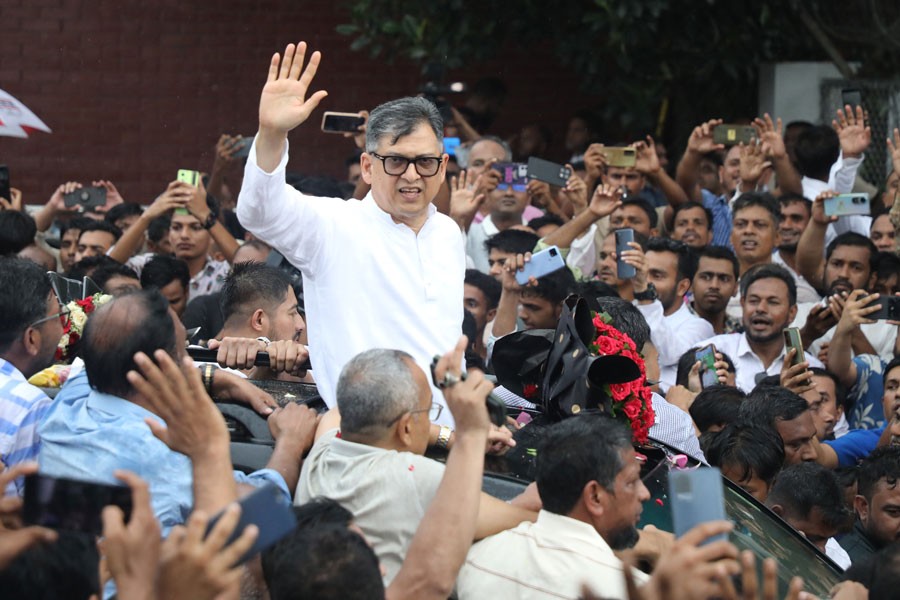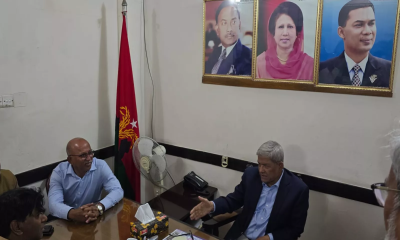In a bold statement on Wednesday, February 5, Salahuddin Ahmed, a senior leader of BNP’s Standing Committee, declared that no one would be able to do politics in Bangladesh under the name of the Awami League anymore.
He shared these thoughts while speaking as the chief guest at a discussion event titled “National Unity and Current Realities” at the National Press Club.
Salahuddin Ahmed voiced his support for the interim government’s decision to prevent the Awami League from holding political programs in the streets.
"The interim government has decided not to allow the Awami League to take to the streets for any political activities. I support this decision, but how long will the police stop the Awami League?" he asked, highlighting his concerns over how long such a strategy can hold up.
He then pointed out a contradiction in the government’s actions.
"You say that you don’t want the Awami League to be part of the elections and that they shouldn`t be allowed to do politics in the country, but what actions are being taken? The government is not taking any legal steps," he said.
Salahuddin urged the government to take concrete steps, calling for a legal approach to handle the situation.
The BNP leader also emphasized that, under Article 47 of the Constitution, the Awami League should be held accountable for its role in crimes like genocide and crimes against humanity. He mentioned,
"We have demanded that the Awami League, as a political entity, be judged for these serious crimes. This demand has come from the people of Bangladesh too, and we have also called for amendments to the laws of the International Crimes Tribunal."
Salahuddin questioned the government’s stance, saying,
"The government had initially planned to amend ordinances and laws, but suddenly in a cabinet meeting, they decided that this wouldn`t be done. Why? On one hand, they say the Awami League should be banned from politics, yet they refuse to prosecute them and continue to block their political activities with police action. This inconsistency is not acceptable."
He further stated,
"The people of Bangladesh, through an uprising led by students and citizens, have rejected the Awami League’s politics. They have rejected Awami fascism and expelled them from the political scene. This is why the Awami League, under its current name, will not be allowed to engage in politics any longer."
Salahuddin also stressed that it was time for legal action.
"We demand that the Awami League be judged for its crimes, and the judicial process should decide if they can continue to do politics or participate in elections in Bangladesh. The law must be applied as per the Constitution," he urged.
Turning his attention to the future of Bangladesh’s political system, Salahuddin emphasized the importance of democratic reforms.
"We aim to establish a constitutional government that is based on democratic principles. To do this, we must prioritize election-related reforms. We need to identify short-term reforms required for the election process, consult with political parties, and implement the necessary legal changes. After those changes, institutional reforms can be made, but that will take time," he explained.
Salahuddin also offered an update on the electoral process.
"The Election Commission has nearly completed the voter list, and by March 2, the final list will be ready. After that, hearings and objections will take place, and everything should be wrapped up within two months. Other election-related activities should not take much time, and they can run parallel to the voter list preparations," he said.
He warned the government against delays.
"If you delay the process intentionally, the people will not accept it. We have fought for years for a neutral caretaker government. A free and fair election requires a caretaker government. You have already sworn in as an interim government under the Constitution," Salahuddin said, reminding the authorities of their constitutional obligation.
Addressing the interim government, he continued,
"If you delay the election, you must justify it to the people. Have you provided an explanation? Have you listened to us? There is still time, and I believe the government should discuss and present a clear election roadmap. If that roadmap is reasonable, the people will accept it."
He also made it clear that elections could happen sooner than expected.
"We have said that the elections can be held by July or August, or even earlier. We want to go for elections after making some legal and institutional reforms. Some say reforms should come first, and then elections; others say elections should come first, and then reforms. There is no room for confusion here. Reforms are an ongoing process, and we must continue making them. The idea that reforms should be completed before elections is simply not correct."
Salahuddin also pointed out the need for specific reforms related to elections, including amendments to the Representation of the People Order (RPO), as well as changes in the police, judiciary, and administration to ensure neutrality.
"These reforms must be made to ensure a fair and impartial election. We need to prepare for the elections with these necessary changes in place. If we talk about elections too much, some may question why we are focusing so much on it. But we must ask, if not elections, then what should we focus on?" he concluded.
This statement from Salahuddin Ahmed reveals the growing political tensions in Bangladesh, with BNP strongly opposing the Awami League`s political activities and pushing for changes to ensure a fair election process.
It shows a continued struggle for democratic reforms and political justice.














-20260226080139.webp)






-20260225072312.webp)










-20260219054530.webp)
-20260224075258.webp)





-20260221022827.webp)